Unit 5 What were you doing when the rainstorm came? 单元总复习课件29张PPT
文档属性
| 名称 | Unit 5 What were you doing when the rainstorm came? 单元总复习课件29张PPT |
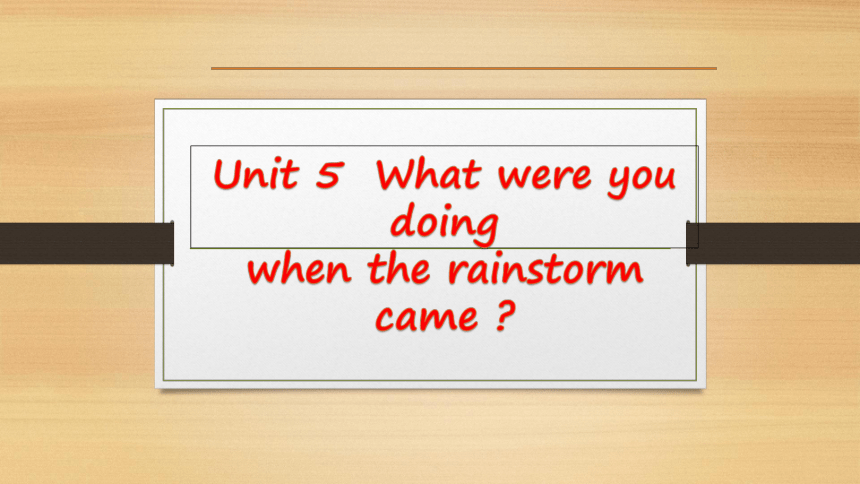
|
|
| 格式 | pptx | ||
| 文件大小 | 1.5MB | ||
| 资源类型 | 教案 | ||
| 版本资源 | 人教新目标(Go for it)版 | ||
| 科目 | 英语 | ||
| 更新时间 | 2021-02-21 00:00:00 | ||
图片预览

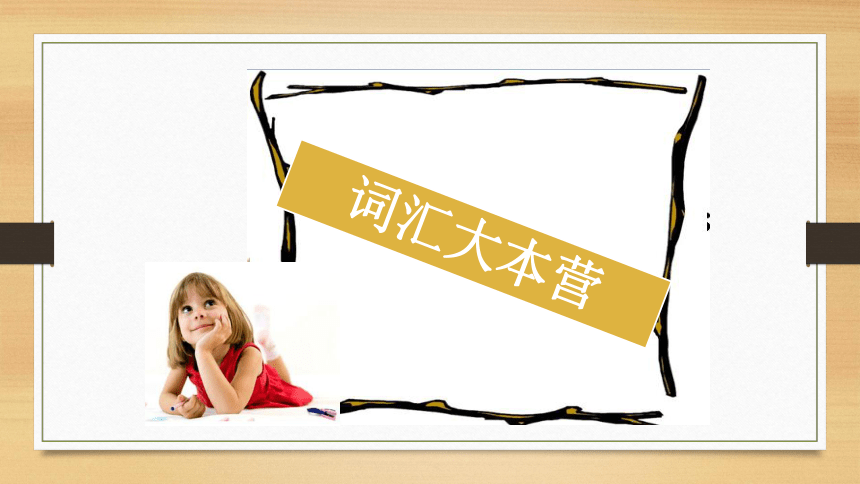
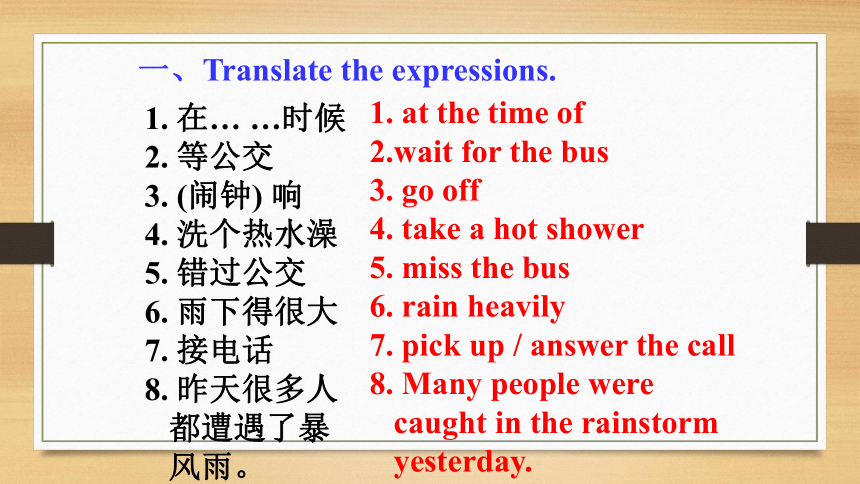
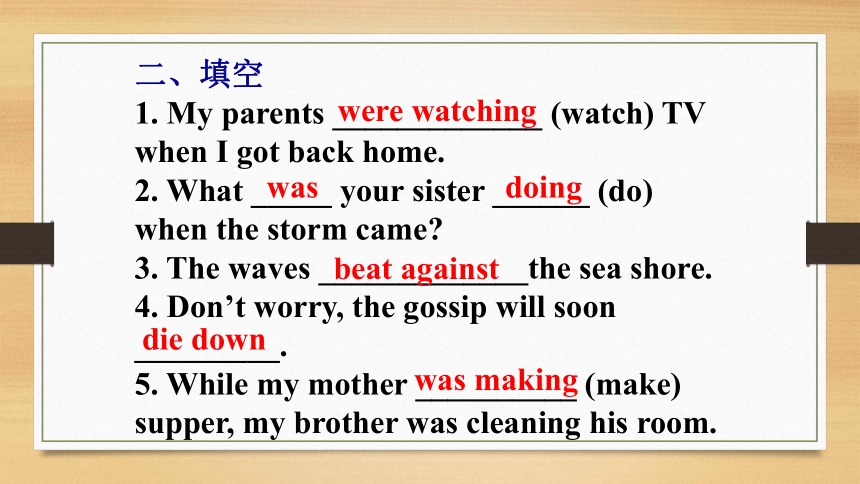
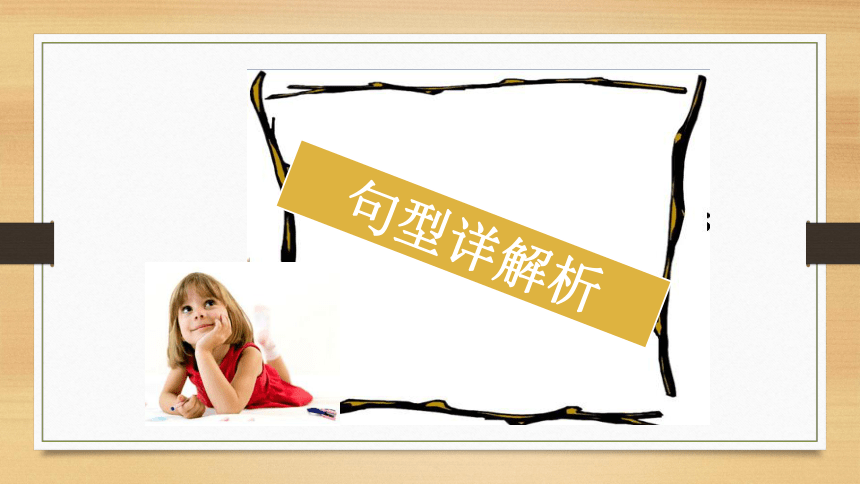
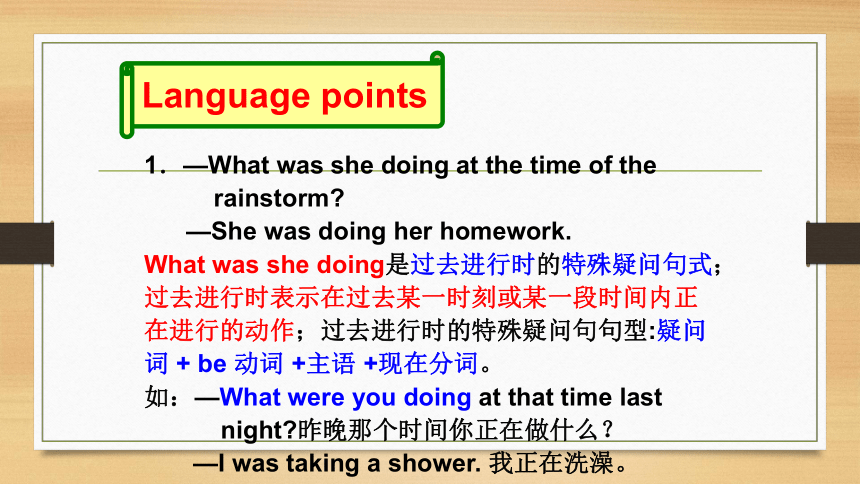
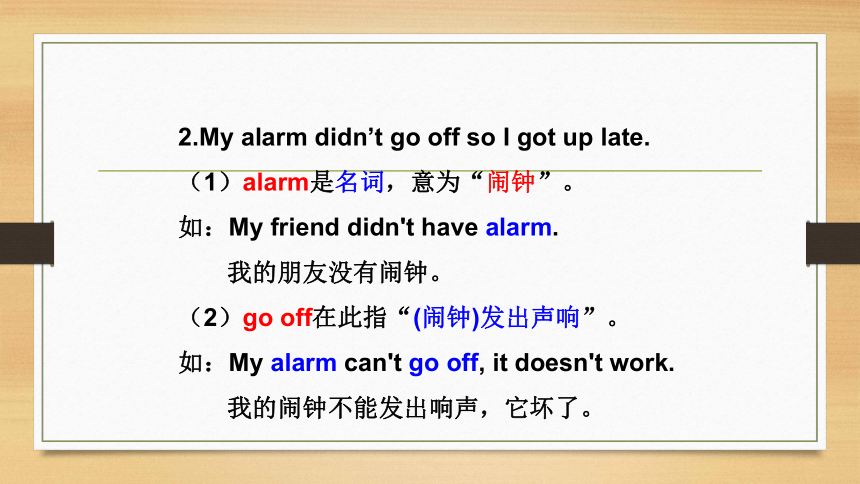
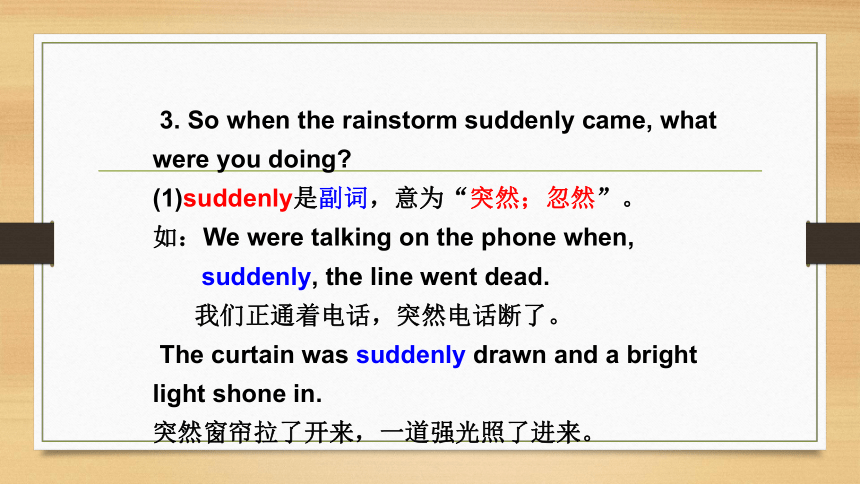
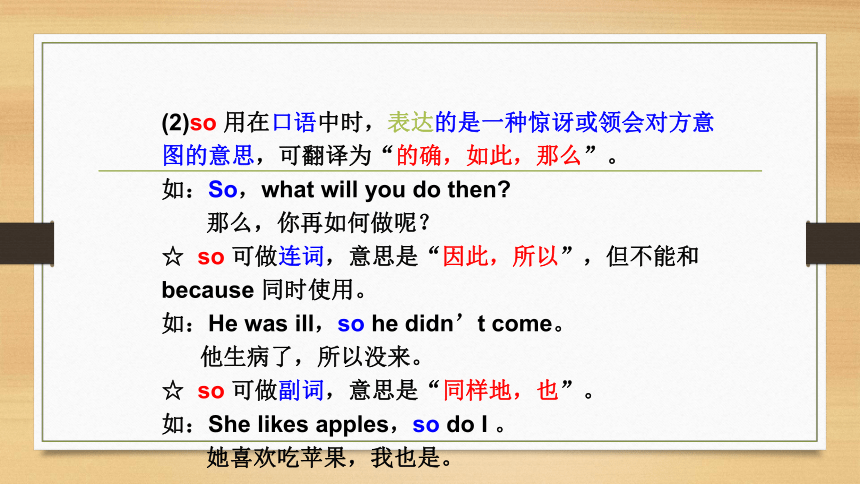
文档简介
Unit 5 What were you doing
when the rainstorm came ?
词汇大本营
在… …时候
等公交
(闹钟) 响
洗个热水澡
错过公交
雨下得很大
接电话
昨天很多人都遭遇了暴风雨。
at the time of
wait for the bus
go off
take a hot shower
miss the bus
rain heavily
pick up / answer the call
Many people were caught in the rainstorm yesterday.
一、Translate the expressions.
二、填空
1. My parents _____________ (watch) TV when I got back home.
2. What _____ your sister ______ (do) when the storm came?
3. The waves _____________the sea shore.
4. Don’t worry, the gossip will soon _________.
5. While my mother __________ (make) supper, my brother was cleaning his room.
were watching
was
doing
beat against
die down
was making
句型详解析
Language points
1.—What was she doing at the time of the
rainstorm?
—She was doing her homework.
What was she doing是过去进行时的特殊疑问句式;过去进行时表示在过去某一时刻或某一段时间内正在进行的动作;过去进行时的特殊疑问句句型:疑问词 + be 动词 +主语 +现在分词。
如:—What were you doing at that time last
night?昨晚那个时间你正在做什么?
—I was taking a shower. 我正在洗澡。
2.My alarm didn’t go off so I got up late.
(1)alarm是名词,意为“闹钟”。
如:My friend didn't have alarm.
我的朋友没有闹钟。
(2)go off在此指“(闹钟)发出声响”。
如:My alarm can't go off, it doesn't work.
我的闹钟不能发出响声,它坏了。
3. So when the rainstorm suddenly came, what were you doing?
(1)suddenly是副词,意为“突然;忽然”。
如:We were talking on the phone when,
suddenly, the line went dead.
我们正通着电话,突然电话断了。
The curtain was suddenly drawn and a bright light shone in.
突然窗帘拉了开来,一道强光照了进来。
(2)so 用在口语中时,表达的是一种惊讶或领会对方意图的意思,可翻译为“的确,如此,那么”。
如:So,what will you do then?
那么,你再如何做呢?
☆ so 可做连词,意思是“因此,所以”,但不能和because 同时使用。
如:He was ill,so he didn’t come。
他生病了,所以没来。
☆ so 可做副词,意思是“同样地,也”。
如:She likes apples,so do I 。
她喜欢吃苹果,我也是。
4. I called at seven and you didn’t pick up.
(1)pick up在此意为“接电话”。
如:Why doesn't he pick up?
为什么他不接电话?
(2)pick up意为“捡起;收集;继续;得到;
接人;偶然结识”。
如: He picked up the child and put her on
his shoulders.
他抱起孩子让她骑在自己的肩膀上。
He picked up news from all sources.
他从各种渠道收集消息。
单项选择。
1. What ____ you ____ at this time yesterday?
A. did; do B. are; doing
C. were; doing D. is; do
2. ____ Tom was playing computer games,
his father came in.
A. When B. While C. Until D. After
C
B
5. With no lights outside,it felt like midnight.
light是名词,意为“光;光线;光亮”, 如果其前有形容词修饰,可与a连用。 light在句中有时可用作定语。
如:I try to see but I'm blinded by the white
light.
我试着去看,但是有道白光让我什么都看不到。
I can't read while you are standing in my light.
你挡住了我的光线,我没法看书。
6. He finally fell asleep when the wind was dying down at around 3:00 a.m.
die down意为“逐渐变弱;逐渐消失”,其中die的现在分词是dying。
如:The fire had died down, so we put more
coal on it.
炉火变弱了,我们再加了些煤。
Open the air hole; the fire is dying down.
把气孔打开,火要熄了。
1. It took a long time for the excitement to
_______.
A. die of B. die down
C. dying down D. die from
2. It was raining heavily outside and I could
not ______ for a long time.
A. go to bed B. be asleep
C. fall asleep C. be sleepy
B
B
7.Although some people may not remember
who killed him, they remember what they
were doing when they heard the news.
although 相当于though 或even though,意为“尽管,虽然”,做连词,用来引导让步状语从句。这三个词都不能和but连用,但可以和副词yet,still,连用,也可以用but改写为同义句。
如:Although he is poor,he is still evry happy .
= He is poor, but he is still very happy .
虽然很穷,但他还是很幸福。
8. We were having fun in the playground when the school bell rang.
(1)have fun意为“玩得开心”,与该词组意思相同的短语是:enjoy oneself ,have a good time.
如:It's a good place to have fun.
那是个玩耍的好地方。
Did you have fun at the wedding?
你在婚礼上玩儿的好吗?
(2)playground是名词,意为“操场”。
如:The students are playing on the playground.
学生们正在操场上玩。
The children were taking turns on the slides in the playground.
孩子们在操场上轮流滑滑梯。
1. Don't _____ the window when the car is
running on the road. It's too dangerous.
A. look for B. look at
C. look out D. look up
2. He was ____ in a car accident.
A. kill B. to kill C. killed D. killing
3. ____ the water was cold, Wei Qinggang
jumped into it to save the little boy.
A. When B. Although C. If D. Because
C
C
B
语法加油站
表示过去某一时刻或一段时间内正在进
行的动作。常和表示过去的时间状语连
用,如: at this time yesterday/
at 9:00 last night/ from 7:00 to 10:00
yesterday morning 等。
1. 过去进行时的定义&构成:
构成: was/were + v-ing,was用于主语是第一人称及第三人称单数的句子中,were用于主语是第二人称及其他复数人称的句子中。
肯定句: 主语+was/were +V-ing+其他
She was eating breakfast at 6 am yesterday. 昨天早上6点她正在吃早饭。
否定句: 主语+wasn’t/weren’t +V-ing+其他
We weren’t watching TV at that time.
那时我们没在看电视。
2. 基本句型:
疑问句: Was/Were +主语+V-ing+其他?
Yes, 主语+was/ were.
No, 主语+wasn’t/weren’t.
—Were you playing basketball at that time?
那时你们正在打篮球吗?
— Yes, we were. / No, we weren’t.
是的,我们在打篮球。 /
不,我们不在打篮球。
特殊疑问句:What was/were+主语+V-ing?
What were you doing at 7:00 last night?
昨晚7点你在做什么?
Look at the picture and fill in the blanks.
Sarah goes to work every day. She is always there from 8:30 a.m. until 4:30 p.m.
It is 11 o’clock now. Sarah __________ a telephone call.
At 11 o’clock yesterday, she ___________ a telephone call, too.
is making
was making
What’s the difference between them?
3. 现在进行时和过去进行时的区别:
过去进行时
现在进行时
意义
结构
例子
表示过去某时或某段时间正在进行的动作
表示说话时正在进行的动作
was/were + doing
am/is/are + doing
1)My parents were watching TV at 8:30 yesterday evening.
2)I wasn’t doing my homework at 10:00 last night.
1)I am writing a letter now.
2)Look!They are waiting for you.
4.一般过去时和过去进行时的区别:
He read a book last night.
昨天晚上他读了一本书。(读完了)
He was reading a story book last night.
昨天晚上他正在读故事书。(还没有读完)
一般过去时
过去进行时
相同点
不同点
表示过去的时间里发生的动作,往往已经完成
表示过去某一时刻或时段正在进行的动作
表示过去发生的动作
when/while用法区别
1) *when: 既指时间点,也可指一段时间
while: 只表示一段时间
*when引导的时间状语从句中的动词可以是瞬间性动词,也可是延续性动词
while从句中的动词必须是延续性动词
We were having dinner when the phone rang.
I lived in a small village when I was a young boy.
While my sister was doing the ironing, I cooked dinner.
2) ①由when引导的时间状语从句常用一般过去时,主句可用过去进行时
②强调从句和主句的动作同时发生,两句都用过去进行时,多用while引导从句
He was reading in the library when the rainstorm came.
When it began to rain, Ben was helping his mom make dinner.
While Linda was sleeping, Jenny was helping Mary with her homework.
1. Sally took a photo of her friends while
they _____________ (play) computer
games.
2. Just a minute! My brother ___________ (wash) his car in the garden.
3. — Can Peter play games with us, Mrs.
Hawking?
—Wait a minute. He _________ (take) a shower.
4. My uncle __________ (read) books in the room at this time yesterday.
一、适当形式填空。
were playing
is washing
is taking
was reading
5. — Here comes the bus! Where is our
principal?
— She can't go to the museum with us.
She __________ (show) some visitors around our school.
6. What ____ you ______ (do) when the captain came in?
7.—Alice, would you mind not playing the
guitar? I _________ (talk) on the phone.
—Oh, sorry, mom.
doing
am talking
is showing
were
when the rainstorm came ?
词汇大本营
在… …时候
等公交
(闹钟) 响
洗个热水澡
错过公交
雨下得很大
接电话
昨天很多人都遭遇了暴风雨。
at the time of
wait for the bus
go off
take a hot shower
miss the bus
rain heavily
pick up / answer the call
Many people were caught in the rainstorm yesterday.
一、Translate the expressions.
二、填空
1. My parents _____________ (watch) TV when I got back home.
2. What _____ your sister ______ (do) when the storm came?
3. The waves _____________the sea shore.
4. Don’t worry, the gossip will soon _________.
5. While my mother __________ (make) supper, my brother was cleaning his room.
were watching
was
doing
beat against
die down
was making
句型详解析
Language points
1.—What was she doing at the time of the
rainstorm?
—She was doing her homework.
What was she doing是过去进行时的特殊疑问句式;过去进行时表示在过去某一时刻或某一段时间内正在进行的动作;过去进行时的特殊疑问句句型:疑问词 + be 动词 +主语 +现在分词。
如:—What were you doing at that time last
night?昨晚那个时间你正在做什么?
—I was taking a shower. 我正在洗澡。
2.My alarm didn’t go off so I got up late.
(1)alarm是名词,意为“闹钟”。
如:My friend didn't have alarm.
我的朋友没有闹钟。
(2)go off在此指“(闹钟)发出声响”。
如:My alarm can't go off, it doesn't work.
我的闹钟不能发出响声,它坏了。
3. So when the rainstorm suddenly came, what were you doing?
(1)suddenly是副词,意为“突然;忽然”。
如:We were talking on the phone when,
suddenly, the line went dead.
我们正通着电话,突然电话断了。
The curtain was suddenly drawn and a bright light shone in.
突然窗帘拉了开来,一道强光照了进来。
(2)so 用在口语中时,表达的是一种惊讶或领会对方意图的意思,可翻译为“的确,如此,那么”。
如:So,what will you do then?
那么,你再如何做呢?
☆ so 可做连词,意思是“因此,所以”,但不能和because 同时使用。
如:He was ill,so he didn’t come。
他生病了,所以没来。
☆ so 可做副词,意思是“同样地,也”。
如:She likes apples,so do I 。
她喜欢吃苹果,我也是。
4. I called at seven and you didn’t pick up.
(1)pick up在此意为“接电话”。
如:Why doesn't he pick up?
为什么他不接电话?
(2)pick up意为“捡起;收集;继续;得到;
接人;偶然结识”。
如: He picked up the child and put her on
his shoulders.
他抱起孩子让她骑在自己的肩膀上。
He picked up news from all sources.
他从各种渠道收集消息。
单项选择。
1. What ____ you ____ at this time yesterday?
A. did; do B. are; doing
C. were; doing D. is; do
2. ____ Tom was playing computer games,
his father came in.
A. When B. While C. Until D. After
C
B
5. With no lights outside,it felt like midnight.
light是名词,意为“光;光线;光亮”, 如果其前有形容词修饰,可与a连用。 light在句中有时可用作定语。
如:I try to see but I'm blinded by the white
light.
我试着去看,但是有道白光让我什么都看不到。
I can't read while you are standing in my light.
你挡住了我的光线,我没法看书。
6. He finally fell asleep when the wind was dying down at around 3:00 a.m.
die down意为“逐渐变弱;逐渐消失”,其中die的现在分词是dying。
如:The fire had died down, so we put more
coal on it.
炉火变弱了,我们再加了些煤。
Open the air hole; the fire is dying down.
把气孔打开,火要熄了。
1. It took a long time for the excitement to
_______.
A. die of B. die down
C. dying down D. die from
2. It was raining heavily outside and I could
not ______ for a long time.
A. go to bed B. be asleep
C. fall asleep C. be sleepy
B
B
7.Although some people may not remember
who killed him, they remember what they
were doing when they heard the news.
although 相当于though 或even though,意为“尽管,虽然”,做连词,用来引导让步状语从句。这三个词都不能和but连用,但可以和副词yet,still,连用,也可以用but改写为同义句。
如:Although he is poor,he is still evry happy .
= He is poor, but he is still very happy .
虽然很穷,但他还是很幸福。
8. We were having fun in the playground when the school bell rang.
(1)have fun意为“玩得开心”,与该词组意思相同的短语是:enjoy oneself ,have a good time.
如:It's a good place to have fun.
那是个玩耍的好地方。
Did you have fun at the wedding?
你在婚礼上玩儿的好吗?
(2)playground是名词,意为“操场”。
如:The students are playing on the playground.
学生们正在操场上玩。
The children were taking turns on the slides in the playground.
孩子们在操场上轮流滑滑梯。
1. Don't _____ the window when the car is
running on the road. It's too dangerous.
A. look for B. look at
C. look out D. look up
2. He was ____ in a car accident.
A. kill B. to kill C. killed D. killing
3. ____ the water was cold, Wei Qinggang
jumped into it to save the little boy.
A. When B. Although C. If D. Because
C
C
B
语法加油站
表示过去某一时刻或一段时间内正在进
行的动作。常和表示过去的时间状语连
用,如: at this time yesterday/
at 9:00 last night/ from 7:00 to 10:00
yesterday morning 等。
1. 过去进行时的定义&构成:
构成: was/were + v-ing,was用于主语是第一人称及第三人称单数的句子中,were用于主语是第二人称及其他复数人称的句子中。
肯定句: 主语+was/were +V-ing+其他
She was eating breakfast at 6 am yesterday. 昨天早上6点她正在吃早饭。
否定句: 主语+wasn’t/weren’t +V-ing+其他
We weren’t watching TV at that time.
那时我们没在看电视。
2. 基本句型:
疑问句: Was/Were +主语+V-ing+其他?
Yes, 主语+was/ were.
No, 主语+wasn’t/weren’t.
—Were you playing basketball at that time?
那时你们正在打篮球吗?
— Yes, we were. / No, we weren’t.
是的,我们在打篮球。 /
不,我们不在打篮球。
特殊疑问句:What was/were+主语+V-ing?
What were you doing at 7:00 last night?
昨晚7点你在做什么?
Look at the picture and fill in the blanks.
Sarah goes to work every day. She is always there from 8:30 a.m. until 4:30 p.m.
It is 11 o’clock now. Sarah __________ a telephone call.
At 11 o’clock yesterday, she ___________ a telephone call, too.
is making
was making
What’s the difference between them?
3. 现在进行时和过去进行时的区别:
过去进行时
现在进行时
意义
结构
例子
表示过去某时或某段时间正在进行的动作
表示说话时正在进行的动作
was/were + doing
am/is/are + doing
1)My parents were watching TV at 8:30 yesterday evening.
2)I wasn’t doing my homework at 10:00 last night.
1)I am writing a letter now.
2)Look!They are waiting for you.
4.一般过去时和过去进行时的区别:
He read a book last night.
昨天晚上他读了一本书。(读完了)
He was reading a story book last night.
昨天晚上他正在读故事书。(还没有读完)
一般过去时
过去进行时
相同点
不同点
表示过去的时间里发生的动作,往往已经完成
表示过去某一时刻或时段正在进行的动作
表示过去发生的动作
when/while用法区别
1) *when: 既指时间点,也可指一段时间
while: 只表示一段时间
*when引导的时间状语从句中的动词可以是瞬间性动词,也可是延续性动词
while从句中的动词必须是延续性动词
We were having dinner when the phone rang.
I lived in a small village when I was a young boy.
While my sister was doing the ironing, I cooked dinner.
2) ①由when引导的时间状语从句常用一般过去时,主句可用过去进行时
②强调从句和主句的动作同时发生,两句都用过去进行时,多用while引导从句
He was reading in the library when the rainstorm came.
When it began to rain, Ben was helping his mom make dinner.
While Linda was sleeping, Jenny was helping Mary with her homework.
1. Sally took a photo of her friends while
they _____________ (play) computer
games.
2. Just a minute! My brother ___________ (wash) his car in the garden.
3. — Can Peter play games with us, Mrs.
Hawking?
—Wait a minute. He _________ (take) a shower.
4. My uncle __________ (read) books in the room at this time yesterday.
一、适当形式填空。
were playing
is washing
is taking
was reading
5. — Here comes the bus! Where is our
principal?
— She can't go to the museum with us.
She __________ (show) some visitors around our school.
6. What ____ you ______ (do) when the captain came in?
7.—Alice, would you mind not playing the
guitar? I _________ (talk) on the phone.
—Oh, sorry, mom.
doing
am talking
is showing
were
同课章节目录
- Unit 1 What's the matter?
- Section A
- Section B
- Unit 2 I'll help to clean up the city parks.
- Section A
- Section B
- Unit 3 Could you please clean your room?
- Section A
- Section B
- Unit 4 Why don't you talk to your parents?
- Section A
- Section B
- Unit 5 What were you doing when the rainstorm came
- Section A
- Section B
- Review of Units 1-5
- Unit 6 An old man tried to move the mountains.
- Section A
- Section B
- Unit 7 What's the highest mountain in the world?
- Section A
- Section B
- Unit 8 Have you read Treasure Island yet?
- Section A
- Section B
- Unit 9 Have you ever been to a museum?
- Section A
- Section B
- Unit 10 I've had this bike for three years.
- Section A
- Section B
